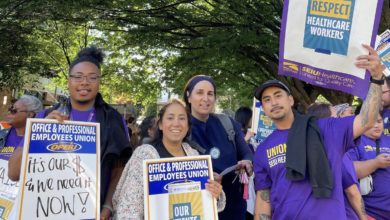A study recently released by the California Nurses Association /National Nurses Organizing Committee revealed that in California alone, more than one in five requests for treatment, even when recommended by a patient’s physician, is denied by the state’s largest private insurers.
From 2002 through June 30, 2009, six of the largest companies rejected 47.7 million claims. They refused to cover 22 percent of all requests.
During the first six months of 2009—in the midst of an economic crisis—the CNA/NNOC found that the numbers of denials of coverage by “insurance” companies in California are shockingly high, reporting the following breakdown for six of the largest companies:
Pacificare: 39.6% denied
Cigna: 32.7% denied
HealthNet: 30% denied
Kaiser Permanente: 28.3% denied
Blue Cross: 27.9% denied
Aetna: 6.4% denied
As Congress debates health care reform, the pharmaceutical and insurance companies are using every possible means to defeat any health care reform that would undercut their profits. One of their claims, circulated again and again, is that a public health care system, or even the milder public option, will “put a government bureaucrat between you and your doctor.”
The CNA/NNOC study presents factual evidence that the very real obstacles between patients and treatment are not mythical “government bureaucrats” but corporations driven by profit. Workers are forced to pay into medical plans “just in case,” but when needed, their “insurers” deny coverage.
The numbers are telling. The Harvard Medical Review reports that 62.1 percent of bankruptcies are due to medical expenses. While denying millions of claims and forcing workers either to forego treatment or go bankrupt, the top 18 insurance giants collected $15.9 billion in profits last year alone.
This drive for private profit kills. “Every claim that is denied represents a real patient enduring pain and suffering. Every denial has real, sometimes fatal consequences,” stated Deborah Burger, RN and CNA/NNOC co-president. Case managers for big HMOs are receiving lavish bonuses for finding ways to deny coverage of crucial, potentially life-saving procedures and plans of care. By refusing payment for treatment, the corporations are reaping billions in profits by letting people die.
The reasons given by companies in defense of their denials are superficial and evasive. They assert that the requested treatment is “not covered” or “experimental” and that claims are “duplicative.”
Nicole Kasabian Evans, spokesperson for the California Association of Health Plans, stated that “it appears that a good deal of the so-called rejections are paperwork issues.” Rebecca Patchin, anesthesiologist at Loma Linda University and board chairwoman of the American Medical Association, noted that each insurer has a different set of “obscure, bureaucratic rules for processing and paying medical claims.”
It appears the private health care corporations have their own issues with red tape. Government-run health care plans in the United States and around the world have proven to be more efficient and cost-effective than private plans.
California Attorney General Jerry Brown reacted to the report, saying, “[H]igh denial rates suggest a system that is dysfunctional and the public is entitled to know whether wrongful business practices are involved.” His statement clearly ignores the real causes of the health care crisis.
The central problem is not public awareness of corporate crime but that health care in the United States is treated as a commodity. The owners of the giant pharmaceutical and insurance companies make record profits while millions remain uninsured or underinsured, and workers are forced to choose between paying rent or the mortgage and the medical bills. Health care is a right, not a commodity.
The only real solution to the health care crisis is the elimination of the profit motive and private arbiters of death. A single-payer system, completely left out of the “debate” in Congress, would be a big step toward this end. Beyond that, centralized planning and a sociallyowned system is the only way to ensure every person’s right to comprehensive medical prevention and care.





